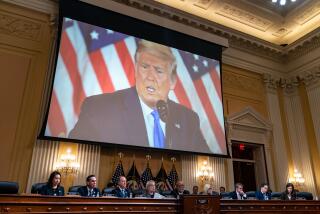9/11 Reforms May Come Soon
- Share via
CRAWFORD, Texas — Responding to pressure from both Congress and Democratic challenger Sen. John F. Kerry, the White House signaled Sunday that President Bush was likely in coming days to adopt at least some of the reforms recommended by the independent commission investigating the Sept. 11 terrorist attacks.
The move suggests that after an initial noncommittal response, the president and his staff have decided to act as soon as possible on some of the less complicated reforms in order to appear responsive to commission -- and public -- demands.
“The president could act within days on [some] recommendations included in the 9/11 commission report,” a White House official said on condition he not be further identified. “Other recommendations may take longer.” He was not specific.
Kerry has raised the heat on Bush, embracing the recommendations immediately after they were announced Thursday and pledging to implement them his first day in office. “There are imperatives that we must move on rapidly,” he said Thursday.
By contrast, Bush had praised the proposed reforms as “serious” but promised only to study them carefully.
That stance began to shift Friday when White House officials announced the president had asked his chief of staff, Andrew H. Card Jr., to head a Cabinet-level task force to determine how many of the recommendations could be implemented by presidential order, without waiting for legislation from Congress.
But Kerry overtook the president again over the weekend, with his advisors announcing Sunday that they had already completed their own analysis and determined that 25 of the 41 recommendations did not require congressional action.
“I offer my full support for immediate action and will work with you to implement the recommendations,” Kerry wrote in a letter Saturday to the commission chairmen.
By outlining the actions that the president could take immediately, Kerry “is saying we shouldn’t wait until the election” to act, said Kerry spokeswoman Stephanie Cutter. “The president can act on them right now.... It’s been almost three years since the 9/11 tragedy. Let’s not wait for the election. Let’s not put this into politics. Let’s get this done.”
The White House official insisted that the president was acting with dispatch, noting that Card had been in touch with the task force members over the weekend.
While many of the recommendations can be implemented by executive order, the most sweeping changes would require legislation. Those include the creation of the post of director of national intelligence, who would oversee all 15 U.S. intelligence agencies, and the formation of an interagency counterterrorism center, replacing discrete units in individual agencies.
On those matters, Congress needs to move quickly, commission members said Sunday.
“Every day that passes is an increased risk [of attack] if we do not make changes,” commission vice chairman Lee H. Hamilton, a former Democratic congressman from Indiana, said on NBC’s “Meet the Press.”
“It’s very clear these people want to kill us,” he added.
Congress adjourned Friday for a six-week summer holiday. Asked what sort of message that sent to the American people, Hamilton responded: “Not a very good one.... We all agree on the urgency of this. We all think that if we do not act quickly, we increase the risk to the American people. We all agree that the status quo is unacceptable.”
Eager to show progress, Senate leaders announced Friday that the Senate Governmental Affairs Committee, which has jurisdiction over any government reorganization, would schedule hearings in August, even though Congress would be out of session.
The chairman of the Senate Select Committee on Intelligence, Pat Roberts (R-Kan.), said Sunday that his committee also would be holding hearings during the break.
House Speaker J. Dennis Hastert (R-Ill.) said Friday that the relevant committees in his chamber would announce their schedules this week.
Former New Jersey Gov. Thomas H. Kean, who headed the commission, addressed the lawmakers’ announcements by noting Sunday, “I can’t say I’m totally satisfied, but I’m encouraged.”
“There is an emergency,” he said on CNN’s “Late Edition.” “These terrorists plan to attack us again as soon as possible, and therefore Congress has got to act now and not next year sometime.”
White House officials said last week that the president, who is spending the week of the Democratic convention at his Texas ranch, would use at least some of his time away from Washington to study the report. White House national security advisor Condoleezza Rice, who would likely be involved in any executive deliberations, is to arrive in Crawford today.
Roberts expressed optimism that the president had decided to move quickly on the report’s recommendations.
“I’ve also been in touch with the White House this weekend. They’re going to have a very proactive meeting right at the first of the week,” Roberts told CNN’s “Late Edition,” suggesting that some legislation could be approved by “either late September or at the very first part of October.”
Bob Kerrey, a member of the commission, told ABC’s “This Week” that only major reforms would show that Congress and the White House are taking the matter seriously.
“We’re asking for a significant change in the laws having to do with intelligence, matching authority with responsibility,” said Kerrey, a former Democratic senator from Nebraska. “Individuals both in the Congress and in the executive branch [are] going to have to give up current authorities, and that’s always difficult to do.”
Reynolds reported from Crawford and La Ganga from Boston.
More to Read
Get the L.A. Times Politics newsletter
Deeply reported insights into legislation, politics and policy from Sacramento, Washington and beyond. In your inbox twice per week.
You may occasionally receive promotional content from the Los Angeles Times.











